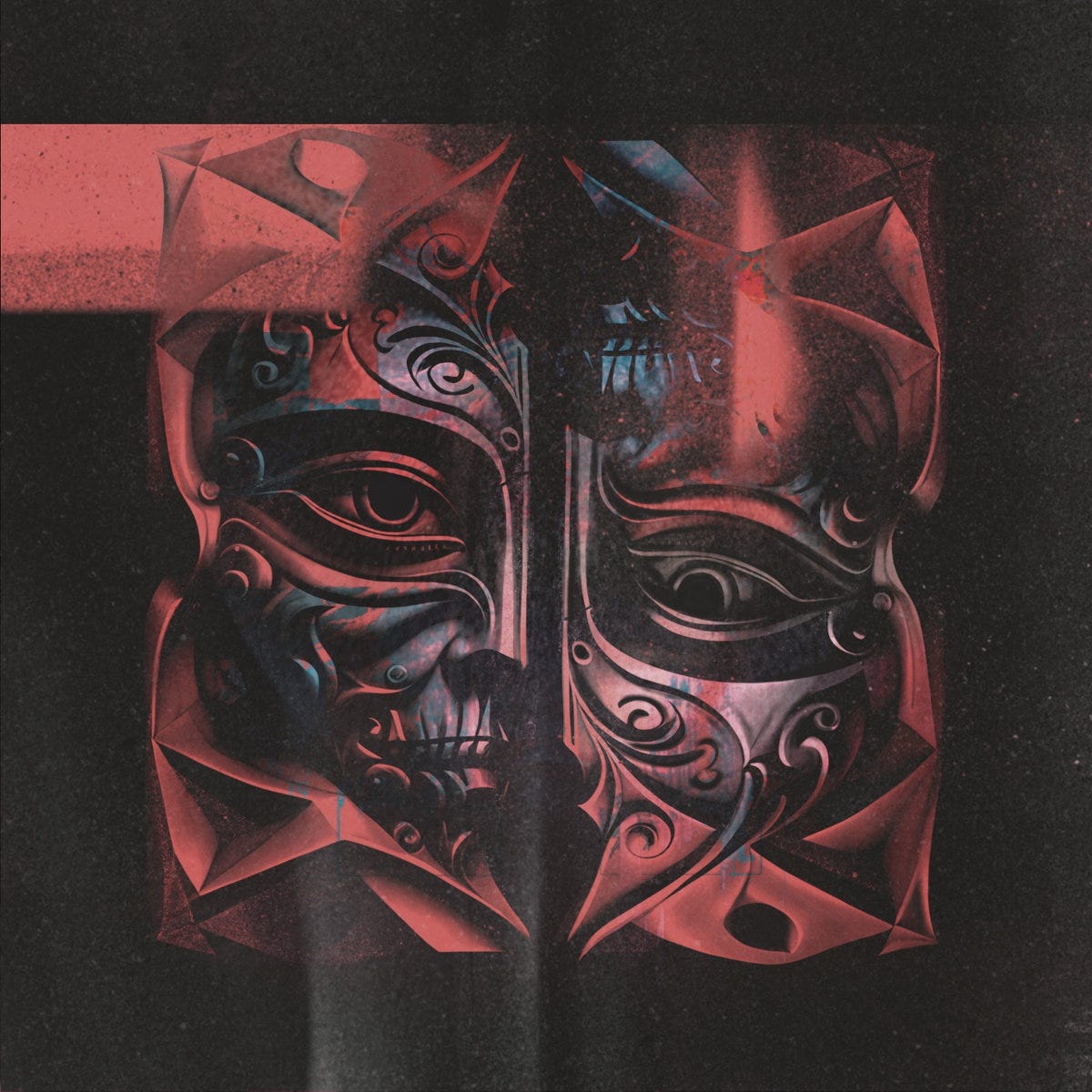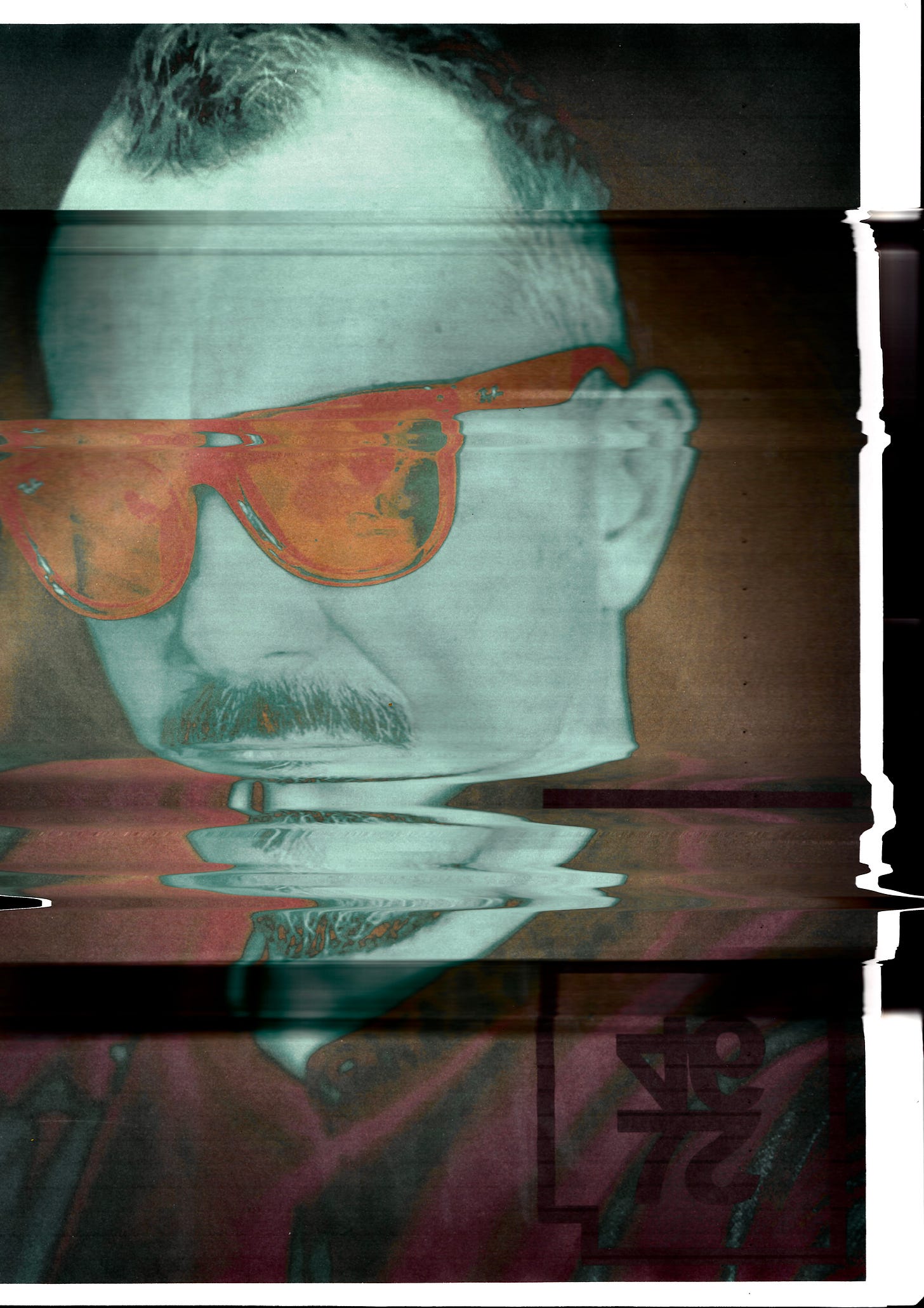Truly Unique
Chatting with Artur Ostrowski about [4672]'s '[Ołów]'
A CD version of [Ołów] will be available through [4672]'s Bandcamp on February 21, 2025.
Music lives inside Artur Ostrowski. "In my head, nothing exists without rhythm," the founder of [4672] writes in an email. "Everything has a frequency. Music is just another language, universally understood yet equally difficult to master."
[4672] has mastered its niche of metal, an industrial-tinged, pulverizing, atom-annihilating rhythmic thwump that places the band among the vanguard of outre Polish extreme acts, such as Kobong, Neuma, Nyia, Samo, and other wayfarers of avant-garde paths. That's no accident.
"They gave me confidence, proof that what I was hearing, that pull, was real," Artur explains regarding bands on the Kobong ancestral tree. "It wasn't just me obsessing over something intangible. Others felt it, too, trying to make sense of it rather than resisting it. Most importantly, they showed me that it's not about fitting in, or rebelling, or fighting against the current. This is for explorers. And for the goosebumps, of course."
Over a growing number of releases that have set the deep underground alight, Artur, Przemysław "J-sick" Trzaskowski, and a rotating cast of musicians, including Antigama's Łukasz Myszkowski, have done exactly that: gone exploring for goosebumps, finding ways to balance [4672]'s braininess and primal urge to headbang, often at the same time. The band's modes are myriad: skull-smashing grooves will feature spicy chords, or proggy progressions will have the rhythmic flutter of unblocked jabs. All of these elements fit together like the gears inside a watch and are as heavy as lead like the band's logo suggests. But for an outfit that feels so locked in, there's this playful sense of flirting with the unknown, of leaving things undefined so it'll come as a surprise when [4672] unveils them. "It's never been about reaching a destination," Artur writes, "just enjoying the ride. And it still is."
Artur's ride started around 14 or 15, and even his memories of the beginning take the shape of one of [4672]'s albums: an intelligent, self-spun narrative that submerges itself in the depths of philosophy. "Memory is a strange thing, don't you think? It deteriorates over time, reshapes itself, and adds new meaning to the same stories. It's almost like another level of perception trying to alter facts until you start to understand things differently. Especially when your connection to those memories begins to fade."
The need to make music never faded for Artur, though. That has always been a constant since the beginning. "I've always felt a strong pull toward it, a 'calling,' you might say," Artur recalls regarding the originating spark that blazed the trail he's currently on. "But now that you ask, I can't pinpoint a single moment. Music was always there, woven into my everyday life, something constant and inseparable, almost like a reflex."
While appreciating music might've been reflexive, starting [4672] required more initiative, specifically when Artur stopped "making excuses and just started doing things instead." That stick-to-itiveness soon bore fruit. "Partially, it was an experiment, maybe even curiosity leading the way. I remember a friend of mine saying something that stuck with me. I couldn't shake the thought, and the next thing I knew, I had [452Hz]."
[452Hz], [4672]'s 2011 debut, is named after the old philharmonic pitch standard. "Indeed, I started using that pitch because I realized it was simply easier for me to play with," Artur writes. "But not without its headaches, I might add."
While the compositional process might've caused the odd headache, [452Hz] sounds fully formed, as if [4672] was born straight from the head of Zeus. There are jackhammer riffs, background-radiation atmosphere, and rhythms one can only call distinctly Polish — tight, complex, and absolutely punishing.
So, about those rhythms. From where are those derived? Are they just part of the Polish consciousness? "We are a stubborn kind, a niche within a niche, in the best possible way of course," Artur answers. "That being said, the roots of this particular style aren't exclusive to anybody. Maybe we've made it our own in certain ways, but globally, we were responding to the same vibration. If you trace it back, every band from around that time, let's say you've been drawn to, carries a fraction of that same message. If you follow the trail backward, you start to see how your favorite bands were inspired, what pulled them in. Eventually, you realize you've been listening to the same thing all along, just filtered through different times or places, and that everybody is telling the same story, just from their own perspective."
2013's [takuboku] continued [4672]'s story. Named after the asteroid that also gave [4672] its name, the band's sophomore outing is simultaneously gloomier and more clever in its stylistic choices than its forebear. "I wanted [takuboku] to be more conceptual and raw, dark, disturbingly chaotic, maybe even…" Artur explains. "On [452Hz], I had help with laying the grooves, but I always had a specific vision for how I wanted them to be. I wasn't expecting anything from that album, so I made it entirely on my own terms. With [takuboku], I expanded on that concept, and it became my thing. I love that album, especially Majcher's vocals. He showed me another side of my music, that you can sort of play with it, sing to it, that nothing should be off limits. As long as it's done in good taste."
"Visual_cortex - [V1]" demonstrates that good taste, a thudding monstrosity that still moves with fleet-footed grace. Majcher's vocals recall Jakub Leonowicz's experimental turn on Nyia's unheralded classic More Than You Expect. And the shifting contrasts that still gel, perhaps [4672] finest trick, are the band’s MO in action.
The vocal-less [noema] followed in 2015, which in the domain of rhetoric means "speech that is intentionally obscure so that its meaning only becomes clear after contemplation." "It also comes from Ancient Greek, meaning concept, idea, perception," Artur notes. "My three favorite states of creation. A fitting description for [4672], too."
It's also fitting because what [4672] creates feels all-enveloping in the same way an odyssey might. "I've always wanted to make music for explorers," Artur explains. "For people who are constantly searching, discovering, obsessing. Albums you can listen to 4,672 times and still find something you missed; music you can experience intimately through headphones or blast loud enough for your neighbors to hear. But most importantly, it is something you can revisit years later and have it feel both familiar and entirely new. Personally, when I revisit old work, not just mine, it's like boarding a train to the past and reliving those inspiring moments all over again."
[4672] minted many of those moments across [takuboku] to [noema], a badass back-to-back run that demonstrated the outfit's evolution. "I think you're right, it does feel like an expansion of the same initial idea I had at the beginning," Artur answers before delving into the compositional process at the time. "The process itself varies from song to song. Some, like 'Szczyty,' were written in a day or two and hardly changed since. Others took a long time to finish, and quite a bit ended up in the bin, too. I think it's natural to seek something different each time. Whether that's the right thing to do, I don't know. But the process controls us, not the other way around. We're just here to witness it all a bit sooner than everyone else."
2019's [æther] took the "sooner" part to heart by streamlining its songs into dense little nuggets of metal. The longest songs clock in at three minutes and fifty seconds, but most sit around the two-minute mark. "I love short songs," Artur writes. "They make you come back to them more often. There are only a handful of artists who can do long tracks the right way, where you actually enjoy the whole thing. I don't think I can do that. Besides, there's too much to say, and you can't fit it all into one track. I always try to shape an album so that each song feels distinctly different, different stories, all touching on the same subject. That way, you can enjoy the album as a whole, start to finish."
While the songs were short, the lineup was large, featuring five singers. "I don't know of another album where five vocalists bring their own qualities and uniqueness to the mix," Artur writes. "I always felt like [æther] was an attempt of 'controlling chaos.'" And [4672] would control that chaos again on [dark æther], an alternate mix companion to its older sibling.
Following some splits and further experiments, [4672] unleashed [Ołów] in November 2024. If you look at the band's Bandcamp, particularly the updated album covers of past releases that look like shuffled tiles on a grid, it seems that the puzzle [4672] began so long ago is finally complete.
[Ołów] feels complete in the aural sense, too, featuring the debut of Łukasz Myszkowski, most known in metal circles as the singer for fellow Polish grinders Antigama. How did Myszkowski slot in? "As always, it was J-sick's idea," Artur answers. "He saw Lucas as part of [4672] years before it even happened. He went to an Antigama show, caught Lucas after, handed him an [æther] CD, and said, 'Listen to this. We'll make the next album together.'"
The prophecy paid off. Even though [4672] slimmed down to a trio for the album — Artur Ostrowski, Przemysław "J-sick" Trzaskowski, Łukasz Myszkowski, along with a guest contribution from Ja Nóż — [Ołów] is a monster, a heaving mass of industrial clangs and eternally sliding rhythms that are additionally adorned with all sorts of avant-garde gilding, such as squiggly bleats of brass and deep, dubby textures. Tracks such as the utterly alien "Klątwa" sound like the three musicians have unlocked something, ushering it in from another dimension. "Sometimes, I feel like I should turn the complexity knob down a notch," Artur admits. "I get caught up in [4672] madness and completely consumed by it. If you gaze long enough into an abyss, the abyss will gaze back into you. (Haha.)"
What the abyss spat back is [Ołów]'s excellent flow. Check out how the near-dark ambient hum of "Mocarz" leads into the aggressive thrum of "Widmo." These two tracks feel of a piece, yet they're also singular, these wonderfully dense vignettes that are like seeing different scenery pass by while you zoom along on an engineering marvel of a modern train. "It's not just an album. It's not a collection of songs you play and sing along to. It's a journey," Artur explains. "Once you accept it for what it is, or what isn't, it unravels. By the time you reach those three minutes in 'Łuna,' you'll welcome them. Because by that point, 'Łuna' has already shown you the present and the past. I know this might sound a bit much, but it'll make sense once we air the whole thing with the video I have in mind."
In conjunction with the album’s release, [4672] released a video for "Wtedy," one of [Ołów]'s standouts. It's an intricately produced piece of stop-motion animation that pairs perfectly with the song, one where the groove really locks in with Myszkowski's roar. In it, a figure drags a coffin across a wasteland. "It was J-sick's idea from the start," Artur writes. "J-sick is SickStudio. I'm just along for the ride. To be honest, making music is easier. But these two things, music and visuals, go well together." Artur later adds: "Any production is a nightmare, and on top of that, you spend a ridiculous amount of time fixing tiny problems. But if you solve enough of them, you might end up with something truly unique, something hard to come by. And that's what we're aiming for."
That's [Ołów] in a nutshell, really: tiny solutions that have formed something truly unique. And like that video’s complicated production, the album similarly fought Artur tooth and nail. "There was a time I thought it would never come out. And for a moment, I even thought it shouldn't. It took the best out of me. Chewed me up and spit me out, over and over again. It pushed me so hard that I still don't fully remember how I finished it. At one point, I abandoned it completely and started working on other things that would only make sense to be released after [Ołów]. It trapped me in a pocket universe for a very long time. And when I finally understood its purpose, I knew I had to push through. But even then, it wasn't enough. This album has a mind of its own (haha). Just kidding. …Or am I? (Haha.)"
Of course, Artur has one more thing to add: "Oh, and I have love/hate relationship with the end of 'Pustynia,' the part that sounds like a scratched CD skipping back and forth. We all know how annoying that is."
That said, "Pustynia"'s faux abraded digital groove is a unique part of this unique album, something that kept coming up in Artur's answers. When asked about his influences, he responds, "It's funny how true the old saying is life writes the best stories. But not in the way people usually mean. It's not about writing about life. It's about taking that excess energy, that weight, and creating something truly unique from it."
And Artur drilled down on that when asked how he maintains his unique voice as a musician. "Trends are fascinating, mostly funny if you ask me. They're easy to follow, briefly inspiring, and just as quickly forgotten. The key is to be yourself. To hold onto your own personality in a world that demands uniformity. I've never been interested in doing things just for the sake of doing them. And to be honest, I can't do anything else. There's no other hobby, no other lifestyle, or obsession like this. I'm just finding my own way through this impossible design. There's a framework, sure; some rules can be bent, others broken. But at the end of the day, that's the process."
That's just it: Sometimes, the process involves looking inside yourself to discover where the music lives.
Got a question? Email us! plagueragespod at gmail
Check out Wolf's other garbage: https://linktr.ee/wrambatz
Our logo and branding are by Mike Teal. Find Mike at www.storylightmarketing.com and www.miketealdesign.com






